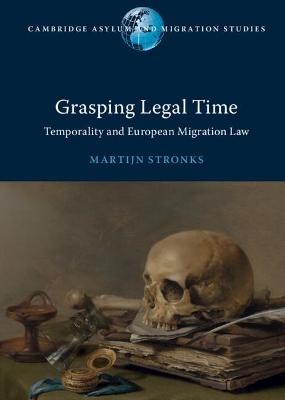
Grasping Legal Time
Temporality and European Migration Law
Seiten
2022
Cambridge University Press (Verlag)
978-1-108-83573-2 (ISBN)
Cambridge University Press (Verlag)
978-1-108-83573-2 (ISBN)
This book explores the sophisticated ways in which time is used in migration law to control and differentiate the presence of migrants within a certain territory. With legal, philosophical, and socio-cultural analysis of temporality and law, it is an innovative text for lawyers, social scientists and philosophers.
Time is one of the most important means for the exercise of power. In Migration Law, it is used for disciplining and controlling the presence of migrants within a certain territory through the intricate interplay of two overlapping but contradicting understandings of time – human and clock time. This book explores both the success and limitations of the usage of time for the governance of migration. The virtues of legal time can be seen at work in several temporal differentiations in migration law: differentiation based on temporality, deadlines, qualification of time and procedural differentiation. Martijn Stronks contests that, hidden in the usage of legal time in Migration Law, there is an argument for the inclusion of migrants on the basis of their right to human time. This assertion is based in the finite, irreversible and unstoppable character of human time.
Time is one of the most important means for the exercise of power. In Migration Law, it is used for disciplining and controlling the presence of migrants within a certain territory through the intricate interplay of two overlapping but contradicting understandings of time – human and clock time. This book explores both the success and limitations of the usage of time for the governance of migration. The virtues of legal time can be seen at work in several temporal differentiations in migration law: differentiation based on temporality, deadlines, qualification of time and procedural differentiation. Martijn Stronks contests that, hidden in the usage of legal time in Migration Law, there is an argument for the inclusion of migrants on the basis of their right to human time. This assertion is based in the finite, irreversible and unstoppable character of human time.
Martijn Stronks is an Assistant Professor at the Amsterdam Centre for Migration and Refugee Law of the Vrije Universiteit Amsterdam. He studied law and philosophy at the Vrije Universiteit Amsterdam and the University of Cape Town, South Africa. His main research interests include migration and human rights law, legal philosophy, and time.
Introduction: Grasping Legal Time; 1. The Virtues of Legal Time; 2. The Vices of Legal Time; 3. Jus Temporis or the Immigrant's Right to Human Time; Conclusion.
| Erscheinungsdatum | 22.09.2021 |
|---|---|
| Reihe/Serie | Cambridge Asylum and Migration Studies |
| Zusatzinfo | Worked examples or Exercises |
| Verlagsort | Cambridge |
| Sprache | englisch |
| Maße | 176 x 249 mm |
| Gewicht | 389 g |
| Themenwelt | Recht / Steuern ► EU / Internationales Recht |
| Recht / Steuern ► Öffentliches Recht ► Völkerrecht | |
| Sozialwissenschaften ► Politik / Verwaltung ► Europäische / Internationale Politik | |
| ISBN-10 | 1-108-83573-2 / 1108835732 |
| ISBN-13 | 978-1-108-83573-2 / 9781108835732 |
| Zustand | Neuware |
| Haben Sie eine Frage zum Produkt? |
Mehr entdecken
aus dem Bereich
aus dem Bereich


